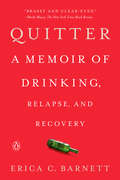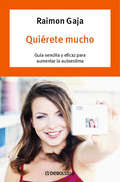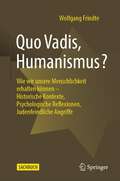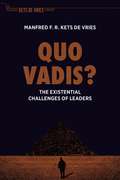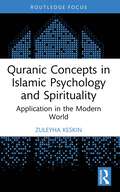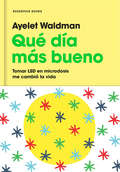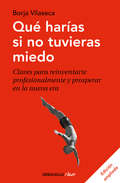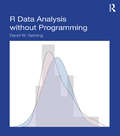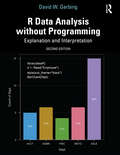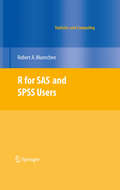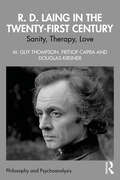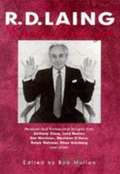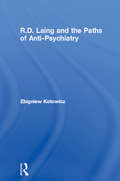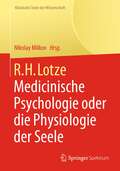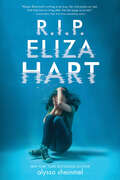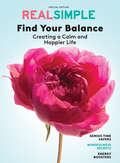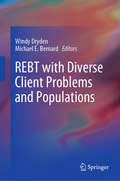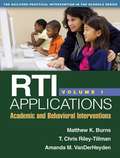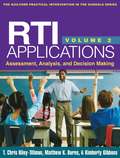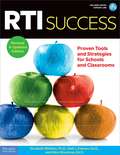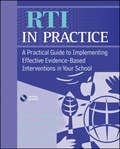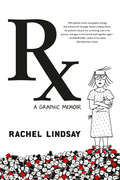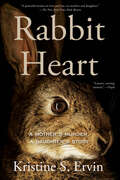- Table View
- List View
Quitter: A Memoir of Drinking, Relapse, and Recovery
by Erica C. Barnett"Emotionally devastating and self-aware, this cautionary tale about substance abuse is a worthy heir to Cat Marnell's How to Murder Your Life." --Publishers Weekly (starred review)A startlingly frank memoir of one woman's struggles with alcoholism and recovery, with essential new insights into addiction and treatmentErica C. Barnett had her first sip of alcohol when she was thirteen, and she quickly developed a taste for drinking to oblivion with her friends. In her late twenties, her addiction became inescapable. Volatile relationships, blackouts, and unsuccessful stints in detox defined her life, with the vodka bottles she hid throughout her apartment and offices acting as both her tormentors and closest friends.By the time she was in her late thirties, Erica Barnett had run the gauntlet of alcoholism. She had recovered and relapsed time and again, but after each new program or detox center would find herself far from rehabilitated. "Rock bottom," Barnett writes, "is a lie." It is always possible, she learned, to go lower than your lowest point. She found that the terms other alcoholics used to describe the trajectory of their addiction--"rock bottom" and "moment of clarity"--and the mottos touted by Alcoholics Anonymous, such as "let go and let God" and "you're only as sick as your secrets"--didn't correspond to her experience and could actually be detrimental.With remarkably brave and vulnerable writing, Barnett expands on her personal story to confront the dire state of addiction in America, the rise of alcoholism in American women in the last century, and the lack of rehabilitation options available to addicts. At a time when opioid addiction is a national epidemic and one in twelve Americans suffers from alcohol abuse disorder, Quitter is essential reading for our age and an ultimately hopeful story of Barnett's own hard-fought path to sobriety.
Quiérete mucho
by Raimon GajaA menudo mantenemos actitudes negativas y generamos pensamientos llenos de desespero que nos desmotivan, nos impiden alcanzar nuestros objetivos y nos hacen sentir desgraciados o culpables. Una baja autoestima impide llevar una vida psicológicamente saludable. Partiendo de la premisa que entender la causa de este problema es el punto de partida para empezar a solucionarlo, Quiérete mucho nos muestra caminos alternativos que nos ayudan a cambiar este patrón negativo y desprendernos de los obstáculos que nos impiden desarrollar todo nuestro potencial. Raimon Gaja trata el tema de la autoestima con el rigor y la importancia que se merece, sin reducirla aun simple aspecto secundario. A través de varios cuestionarios, Quiérete mucho nos da claves para evaluar nuestro nivel de autoestima y saber qué tipo de pensamiento distorsionado tenemos. Estos cuestionarios se repiten para ir comprobando nuestras evoluciones.
Quo Vadis, Humanismus?: Wie wir unsere Menschlichkeit erhalten können - Historische Kontexte, Psychologische Reflexionen, Judenfeindliche Angriffe
by Wolfgang FrindteWie steht es mit den humanistischen Grundlagen unseres Lebens und Zusammenlebens? Müssen wir uns nicht gerade heute dieser Fundamente versichern? Wer greift diese Fundamente an? Um diese Fragen beantworten zu können, nutzt der Autor ein Konstruktionsprinzip, mit dem die humanistischen Anstrengungen seit Petrarca in dreifacher Weise gerahmt werden: Zum einen werden diese Anstrengungen in die jeweiligen historischen Kontexte eingeordnet; zum zweiten greift er auf Reflexionen zurück, die sich in den verschiedenen Entwicklungsetappen der Psychologie explizit oder implizit auf den Humanismus beziehen; drittens schließlich macht er auf judenfeindliche und antisemitische Äußerungen, Vorurteile, Diskriminierungen und Vernichtungsexzesse aufmerksam, um die Ambivalenzen der verschiedenen humanistischen Anstrengungen zu verdeutlichen. Denn, so der Autor, die Einstellung und das Verhalten gegenüber Jüdinnen und Juden sind der Lackmustest eines jeglichen Humanismus.
Quo Vadis?: The Existential Challenges of Leaders (The Palgrave Kets de Vries Library)
by Manfred F. Kets de VriesWritten at a time of global pandemic, when we have been forced to confront age-old existential questions—Why are we here? Where are we going?—perhaps for the first time, Quo Vadis? is extraordinarily relevant to leaders, managers and anyone who wants to bring meaning and authenticity into their work and life. Manfred Kets de Vries argues that we need to address these fundamental and disturbing questions if we are to live fully and meaningfully. Too many people wake up on a Monday morning and do the same things they have done every Monday. They go to work and function on autopilot without questioning their purpose. But how can we make sure our lives are rich and fulfilling? How do we know we’re on the right track? This is a book about death and the fear of death, about angst and absurdity; but it is also about endurance, honesty, well-being, responsibility, living with hard truths, creating meaning—and happiness. Quo Vadis? makes us look full on at the things we prefer not to see. It is a short book that pulls no punches but is far from bleak. Instead, Kets de Vries shows that our life is enriched, and our ability to make meaning and find happiness is increased, when we acknowledge the inevitable price we have to pay for knowing our own mind and understanding our inevitable end.
Quranic Concepts in Islamic Psychology and Spirituality: Application in the Modern World (Islamic Psychology and Psychotherapy)
by Zuleyha KeskinThis book explores how the Qur’ân’s timeless teachings enrich contemporary psychological theories, bridging the gap between Islāmic wisdom and psychological well-being.It offers a comprehensive guide to understanding and applying Qur’ânic concepts in the realm of mental health. Grounded in Islāmic scholarship, it references both classical and modern Islāmic sources to explain fundamental Qur’ânic concepts in Islāmic psychology. The book is structured around three key areas: first, an Islāmic perspective on human faculties, essential for self-knowledge and self-awareness; second, the five pillars of Islam, which play a central role in psychological resilience; and third, various Qur’ânic spiritual concepts linked to mental well-being, such as ṣabr (patience), shukr (gratitude), riḍā (contentment) and iṭmi’nān (peacefulness).By integrating Islāmic principles with contemporary psychological insights and promoting a holistic approach to well-being, this book serves as a vital resource for personal development, academic study, and professional practice, particularly for mental health professionals working with Muslim clients.
Qué día más bueno: Tomar LSD en microdosis me cambió la vida
by Ayelet WaldmanUn mes en la vida de una mujer, escritora, esposa y madre de cuatro hijos que busca la estabilidad depositando sobre su lengua dos gotas de LSD. «Dos días después abrí el buzón y encontré un paquete. En el remite decía "Lewis Carroll". Dentro encontré un frasquito de color azul cobalto.» Hasta entonces, Ayelet Waldman había probado todas las terapias imaginables, de la farmacopea al mindfulness. Pero las tempestades anímicas que le provocaba su trastorno bipolar eran insoportables; marido e hijos sufrían con ella. Dos gotas del frasquito en la lengua y Ayelet se suma a la legión subterránea de ciudadanos que hacen un uso terapéutico del LSD en microdosis. Durante un mes, esta abogada, escritora y madre de adolescentes, lleva un diario sobre el tratamiento. En él también explora la historia y los mitos que rodean al LSD y otras drogas, así como la lucha bizantina que el Estado les antepone. El resultado es un testimonio revelador, tan alegre como fascinante. Críticas:«El libro más divertido que he leído últimamente.»Zadie Smith «Una mirada curiosa y exhaustiva a las posibilidades terapéuticas de las drogas ilegales. Un libro fascinante y profusamente documentado.»Nora Krug, The Washington Post «Un manifiesto lúcido y coherente sobre cómo y por qué la empresa racista e inmoral de la Guerra contra las drogas ha fracasado. Una obra apasionante y persuasiva.»Claire Vaye Watkins, The New Republic «Podría decirse que este libro es la particular guerra de Ayelet Waldman contra la propaganda que subyace a la Guerra contra las drogas, pero es también mucho más que eso y, sobre todo, mucho más divertido.»Rebeca Solnit «Un libro sincero, valiente y muy humano. Normalizando la discusión sobre el LSD, Waldman puede que un día ayude a otros a sentirse normales.»Jennifer Senior, The New York Times
Qué harías si no tuvieras miedo: Claves para reinventarte profesionalmente y prosperar en la nueva era
by Borja VilasecaEs hora de vencer los miedos que nos impiden seguir a nuestro corazón, y emprender una función profesional útil, creativa y con sentido. Si quieres conocer el mercado laboral que se avecina, léete este libro. Si quieres sobrevivir y prosperar en la nueva era, ponlo en práctica. El mundo para el que fuimos educados está dejando de existir. Las reglas del juego económico han cambiado. Somos una generación de transición entre dos eras: la industrial/analógica y la del conocimiento/digital. De ahí que no nos quede más remedio que reinventarnos, cuestionando las viejas creencias y consignas con las que fuimos condicionados. En caso de no hacerlo, pronto quedaremos obsoletos y nos quedaremos fuera del mercado. Lo más difícil consiste en vencer el miedo al cambio. Irónicamente, evitar el riesgo y permanecer en nuestra zona de comodidad es lo más arriesgado quepodemos hacer. Ha llegado la hora de saltar al vacío y emprender la travesía por el desierto, descubriendo de qué manera podemos desarrollar una profesión útil, creativa y con sentido que aporte mucho valor añadido. Solo así lograremos gozar de ingresos económicos abundantes y recurrentes en esta nueva era. «Quién quiere encontrará un medio; quién no, una excusa.» PROVERBIO ÁRABE
Qué nos ha pasado, España
by Fernando ÓnegaTras el éxito de Puedo prometer y prometo y Juan Carlos I, el hombre que pudo reinar, centrados en dos de las figuras emblemáticas que impulsaron la Transición, Fernando Ónega regresa con una biografía política, personal y sentimental de la sociedad española que hizo posible la llegada de la democracia. Franco presumía de haber dejado todo «atado y bien atado» para que su régimen tuviera continuidad más allá de su figura. Sin embargo, en los meses que siguieron a su muerte, los españoles fuimos desatando sin prisa pero sin pausa esos nudos que nos ligaban con el pasado hasta liberarnos del rígido corsé que habíamos llevado durante más de cuarenta años. Un proceso lleno de tensión que contó con un primer gran hito celebrado el 15 de junio de 1977, el día en que acudimos a las urnas por primera vez desde 1936 para elegir a nuestros representantes en las Cortes. Cuando se cumplen cuarenta años de aquellas elecciones y la generación nacida en democracia ha puesto en cuestión la obra de la Transición casi al completo, Fernando Ónega se enfrenta al reto de analizar y comprender cómo la sociedad española ha evolucionado desde la ilusión al desencanto en un periodo de tiempo tan corto. Con una inteligencia y sensibilidad que huye de los lugares comunes, nos ofrece una mirada al pasado desde un presente incierto en busca de respuestas para el futuro de este país. Los lectores han dicho...«Con la agilidad que le da esa especie de caballo que va unido a su verbo, el periodista gallego que le dio metáforas a Suárez explica las noches del arquitecto de la democracia. Lea este libro. Es de periodistas. Y es un gran libro de un gran periodista.»El País «Un original y certero ejercicio que culmina en un libro bien construido que nos invita a parar del ritmo frenético en el que vivimos, mirar hacia nuestro pasado más reciente, compararlo con el presente, reflexionar, analizar y aprender de los errores y los aciertos cometidos para afrontar de forma más eficiente el futuro.»Blog Me gustan los libros
R Data Analysis without Programming
by David W. GerbingThis book prepares readers to analyze data and interpret statistical results using R more quickly than other texts. R is a challenging program to learn because code must be created to get started. To alleviate that challenge, Professor Gerbing developed lessR. LessR extensions remove the need to program. By introducing R through less R, readers learn how to organize data for analysis, read the data into R, and produce output without performing numerous functions and programming exercises first. With lessR, readers can select the necessary procedure and change the relevant variables without programming. The text reviews basic statistical procedures with the lessR enhancements added to the standard R environment. Through the use of lessR, R becomes immediately accessible to the novice user and easier to use for the experienced user. Highlights of the book include: Quick Starts that introduce readers to the concepts and commands reviewed in the chapters. Margin notes that highlight,define,illustrate,and cross-reference the key concepts.When readers encounter a term previously discussed, the margin notes identify the page number to the initial introduction. Scenarios that highlight the use of a specific analysis followed by the corresponding R/lessR input and an interpretation of the resulting output. Numerous examples of output from psychology, business, education, and other social sciences, that demonstrate how to interpret results. Two data sets provided on the website and analyzed multiple times in the book, provide continuity throughout. End of chapter worked problems help readers test their understanding of the concepts. A website at www.lessRstats.com that features the lessR program, the book’s data sets referenced in standard text and SPSS formats so readers can practice using R/lessR by working through the text examples and worked problems, PDF slides for each chapter, solutions to the book’s worked problems, links to R/lessR videos to help readers better understand the program, and more. An ideal supplement for graduate or advanced undergraduate courses in statistics, research methods, or any course in which R is used, taught in departments of psychology, business, education, and other social and health sciences, this book is also appreciated by researchers interested in using R for their data analysis. Prerequisites include basic statistical knowledge. Knowledge of R is not assumed.
R Data Analysis without Programming: Explanation and Interpretation
by David W. GerbingThe new edition of this innovative book, R Data Analysis without Programming, prepares the readers to quickly analyze data and interpret statistical results using R. Professor Gerbing has developed lessR, a ground-breaking method in alleviating the challenges of R programming. The lessR extends R, removing the need for programming. This edition expands upon the first edition’s introduction to R through lessR, which enables the readers to learn how to organize data for analysis, read the data into R, and generate output without performing numerous functions and programming exercises first. With lessR, readers can select the necessary procedure and change the relevant variables with simple function calls. The text reviews and explains basic statistical procedures with the lessR enhancements added to the standard R environment. Using lessR, data analysis with R becomes immediately accessible to the novice user and easier to use for the experienced user. Highlights along with content new to this edition include: Explanation and Interpretation of all data analysis techniques; much more than a computer manual, this book shows the reader how to explain and interpret the results. Introduces the concepts and commands reviewed in each chapter. Clear, relaxed writing style more effectively communicates the underlying concepts than more stilted academic writing. Extensive margin notes highlight, define, illustrate, and cross-reference the key concepts. When readers encounter a term previously discussed, the margin notes identify the page number for the initial introduction. Scenarios that highlight the use of a specific analysis followed by the corresponding R/lessR input, output, and an interpretation of the results. Numerous examples of output from psychology, business, education, and other social sciences, that demonstrate the analysis and how to interpret results. Two data sets are analyzed multiple times in the book, provide continuity throughout. Comprehensive: A wide range of data analysis techniques are presented throughout the book. Integration with machine learning as regression analysis is presented from both the traditional perspective and from the modern machine learning perspective. End of chapter problems help readers test their understanding of the concepts. A website at www.lessRstats.com that features the data sets referenced in both standard text and SPSS formats so readers can practice using R/lessR by working through the text examples and worked problems, R/lessR videos to help readers better understand the program, and more. This book is ideal for graduate and undergraduate courses in statistics beyond the introductory course, research methods, and/or any data analysis course, taught in departments of psychology, business, education, and other social and health sciences; this book is also appreciated by researchers doing data analysis. Prerequisites include basic statistical knowledge, though the concepts are explained from the beginning in the book. Previous knowledge of R is not assumed.
R for SAS and SPSS Users
by Robert A. MuenchenThis book introduces R using SAS and SPSS terms. It demonstrates which of the add-on packages are most like SAS and SPSS and compares them to R's built-in functions. It compares and contrasts the differing approaches of all three packages.
R. D. Laing in the Twenty-First Century: Sanity, Therapy, Love (Philosophy and Psychoanalysis)
by Fritjof Capra M. Guy Thompson Douglas KirsnerIn this remarkable review of the seminal contribution of the Scottish psychiatrist and psychoanalyst, R. D. Laing, the three authors, each intimately acquainted with the subject matter, explore Laing’s intellectual and clinical legacy.Written from the perspective of a psychoanalyst, a scientist, and a philosopher, this unique book thoroughly addresses the three principal themes that defined Laing’s work: his views about sanity and madness, the use of therapy with those suffering from psychotic disturbance, and the vicissitudes of love relationships. They also explore authenticity, altered states, and healing. The authors bring a broad range of viewpoints in assessing Laing’s seminal contribution to contemporary thought, from both a scholarly and personal assessment rooted in each of their diverse relationships with him, both professional and personal.This volume will be of interest to those in the worlds of psychoanalysis, philosophy, science, and anyone with an interest in the work of R. D. Laing.
R. D. Laing: Creative Destroyer
by Bob MullanThis volume collects together accounts, both professional and personal, of R. D. Laing by those who knew him. Some view Laing as important as Jung or Freud - a revolutionary of his time. His psychiatry work in the 1960s and 1970s was unconventional, even radical, and Laing the man evoked a strong response from those who came into contact with him. The book features conversations, letters, photographs and poetry. Contributors include Allen Ginsberg, Anthony Clare, Ralph Metzner and Van Morrison.
R.D. Laing and the Paths of Anti-Psychiatry (Makers of Modern Psychotherapy)
by Zbigniew KotowiczIn the 1960s and 1970s, the radical and visionary ideas of R. D. Laing revolutionized thinking about psychiatric practice and the meaning of madness. His work, from The Divided Self to Knots, and his therapeutic community at Kingsley Hall, made him a household name. But after little more than a decade he faded from prominence as quickly as he had attained it. R.D.Laing and the Paths of Anti-Psychiatry re-examines Laing's work in the context of the anti-psychiatry movement. Concentrating on his most productive decade, the author provides a reasoned critique of Laing's theoretical writings, investigates the influences on his thinking such as phenomenology, existentialism and American family interaction research, and considers the experimental Kingsley Hall therapeutic community in comparison with anti-psychiatry experiments in Germany and Italy. The book provides a much needed reassessment and re-evaluation of Laing's work and its significance for psychotherapy and psychiatry today.
R.H. Lotze: Medicinische Psychologie oder die Physiologie der Seele (Klassische Texte der Wissenschaft)
by Nikolay MilkovOriginaltext mit philosophischen sowie historischen Kommentaren von Nikolay Milkov Als habilitierter Mediziner und Philosoph hat Rudolph Hermann Lotze durch seinen interdisziplinären Ansatz die Entwicklung der Psychologie im 19. Jahrhundert wie kein anderer geprägt. Im Unterschied zu anderen Wissenschaftlern der Zeit hat Lotze die neue Disziplin konsequent in enger Verbindung mit der Philosophie betrachtet, wie besonders in Medicinische Psychologie oder Physiologie der Seele (1852) deutlich wird. Dies bedeutete seine bewusste Abkehr von der Herangehensweise, die Psychologie ganz über experimentelle Untersuchungen und damit die Empirie zu definieren. Lotze scheute sich jedoch, diese entstehende Disziplin „philosophische Psychologie“ zu nennen, für ihn war sie nur physiologische Psychologie, herausgearbeitet mit Hilfe der Philosophie: Sie stellt Tatsachen fest und untersucht, wie Körper und Seele sich zueinander verhalten, tut dies jedoch nicht nur empirisch, sondern auch „metaphysisch“. In diesem Band wird Lotzes Originaltext untersucht, kommentiert und eingebettet in den soziokulturellen Hintergrund der Entstehungszeit, um einen tiefen, aber verständlichen Einblick in diesen Bereich der Psychologie zu geben.
R.I.P. Eliza Hart
by Alyssa SheinmelA gorgeous and haunting contemporary YA in the tradition of We Were Liars.When Eliza Hart, the most popular girl at Ventana Ranch boarding school, is found dead, Ellie Sokoloff is determined to figure out what happened to her. After all, Eliza was Ellie's childhood best friend. Never mind that ever since Ellie arrived at school Eliza has spread terrible rumors about her, calling her a liar and a stalker, when all Ellie wanted to do was rekindle their old friendship. Or that Ellie's claustrophobia limits where she can go and what she can do. Or that Ellie's suitemate, Sam, is the only one who will help her . . . because to everyone else, Ellie looks like the top suspect.Can Ellie clear her name and solve the mystery behind Eliza's death? Her hunt for the truth will uncover secrets she never imagined, sending her deep into her own memories of her childhood with Eliza Hart.New York Times bestselling author Alyssa Sheinmel delivers a gripping mystery and a sensitive and moving examination of the secrets that can hold us back--and even destroy us.
REAL SIMPLE Find Your Balance: Creating a Calm and Happier Life
by The Editors of Real SimpleSlow down, strip away stress, and save your sanity with this practical guide to creating a better life. Let the experts at Real Simple, America's beloved guide to living a better and more authentic life, show you how to relax and get the most out of your days.
REBT in the Treatment of Anxiety Disorders in Children and Adults
by Ioana Alina Cristea Simona Stefan Oana David Cristina Mogoase Anca DobreanThis clinical guide reviews the basics of Rational Emotive Behavior Therapy and presents a quartet of tested protocols for treating anxiety disorders in children and adults. Adult applications feature REBT for treating generalized anxiety disorder and a brief REBT/virtual reality immersion approach to social anxiety disorder. For children and adolescents, a REBT and a rational-emotive educational program address anxiety with interventions tailored to age and developmental considerations. Each protocol suggests measures for screening for suitability and differential diagnosis, explains the usefulness of REBT for the problem, and includes these features: Session-by-session therapist guide with case formulation and relevant techniques. In-session evaluation scales. Client worksheets and exercises. Developmentally appropriate materials for children and adolescents. Agendas for parent sessions to supplement children's therapy. Recommended readings for clients and reference lists for therapists. REBT in the Treatment of Anxiety Disorders in Children and Adults offers a wealth of proven hands-on knowledge not only for practitioners using REBT in their work, such as therapists, clinical psychologists, and counselors, but also for researchers studying the efficacy of psychotherapy interventions for anxiety disorders.
REBT with Diverse Client Problems and Populations
by Michael E. Bernard Windy DrydenThis practice-focused resource demonstrates effective uses of Rational Emotive Behavior Therapy methods and techniques in treating clients across various conditions, settings, and subgroups. Client problems featured include both those often associated with REBT (e.g., anxiety, depression, anger) and others noted for complex presentations, difficulties with engagement, and impasses (e.g., addictions, suicidality, psychosis). Challenging treatment populations are covered as well, including women, couples, families, elder and pediatric clients, clients with disabilities, and sexual minorities. These stimulating cases show how well the diversity of clients and their concerns is matched by the flexibility of techniques and applications within REBT. In each chapter, expert therapists: · Identify concepts in REBT especially suited to approaching the problem or population. · Outline best REBT practices in assessment and treatment of the client(s). · Survey evidence-based non-REBT approaches most useful in complementing REBT. · Provide a brief case example representing appropriate REBT in action. · Assess their use of REBT in treating the problem or members of the population. A bedrock text for REBT scholar-practitioners, REBT with Diverse Populations and Problems is a testimony to the continuing usefulness of the therapy and its adaptability as client populations emerge and as the contexts of client problems evolve in response to a demanding world.
RTI Applications, Volume 1: Academic and Behavioral Interventions (The Guilford Practical Intervention in the Schools Series #1)
by Matthew K. Burns T. Chris Riley-Tillman Amanda M. VanDerHeydenThis book addresses a crucial aspect of sustaining a response-to-intervention (RTI) framework in a school: selecting interventions with the greatest likelihood of success and implementing them with integrity. Leading RTI experts explain how to match interventions to students' proficiency levels, drawing on cutting-edge research about the stages of learning. Effective academic and behavioral interventions for all three tiers of RTI are described in step-by-step detail and illustrated with vivid case examples. In a large-size format with lay-flat binding for easy photocopying, the book features more than 40 reproducible planning tools and other helpful forms. Purchasers also get access to a Web page where they can download and print the reproducible materials.
RTI Applications: Assessment, Analysis, And Decision Making (The Guilford Practical Intervention In The Schools Series #Volume 2)
by Matthew K. Burns T. Chris Riley-Tillman Kimberly Gibbons"This book addresses a crucial aspect of sustaining a response-to-intervention (RTI) framework in a school: selecting interventions with the greatest likelihood of success and implementing them with integrity. <P><P>Leading RTI experts explain how to match interventions to students' proficiency levels, drawing on cutting-edge research about the stages of learning. <P><P>Effective academic and behavioral interventions for all three tiers of RTI are described in step-by-step detail and illustrated with vivid case examples. <P><P>In a large-size format with lay-flat binding for easy photocopying, the book features more than 40 reproducible planning tools and other helpful forms."
RTI Success: Proven Tools And Strategies For Schools And Classrooms
by Elizabeth Whitten Kelli J. Esteves Alice WoodrowThis practical, ready-to-use resource gives teachers and administrators the tools to successfully implement RTI or strengthen an existing program to target students' specific needs. Response to Intervention allows educators to assess and meet the needs of struggling students before they have fallen too far behind. Three expert authors explore this multi-tiered system of support (MTSS), offering over one hundred research-based, instructional techniques and interventions for use in diverse settings, advice on creating personal and positive learning environments, information on co-teaching, and approaches to purposeful grouping. Included in the book and as digital downloads are easy-to-use customizable forms to streamline assessment, implementation, and documentation. Also included is an extensive list of references and resources for further exploration.
RTI in Practice: A Practical Guide to Implementing Effective Evidence-Based Interventions in Your School
by Wright Mcdougal James A. James L. Graney Suzanne B. Ardoin Scott P.A must-have resource for educational professionals implementing Response to Intervention (RTI) programs in their schools RTI in Practice: A Practical Guide to Implementing Effective Evidence-Based Interventions in Your School is an innovative and timely guide that presents concrete, balanced perspectives and directions for implementing an effective RTI model in your school. Built upon the three tiers of effective general education and universal screening, targeted interventions, and intensive interventions, this authoritative resource addresses: Effective academic programs for all students How to use data to make decisions in general education Guidelines for setting goals, monitoring progress, and graphing intervention outcomes Multicultural considerations Realistic case scenarios appear throughout to bring the implementation strategies to life, and the book is packaged with a CD-ROM containing numerous reproducible and customizable forms, surveys, and screening tools, as well as an annotated list of resources for charting and monitoring individual student and classroom progress. RTI in Practice: A Practical Guide to Implementing Effective Evidence-Based Interventions in Your School is a complete resource providing educators and school professionals with the tips?and tools needed for successful RTI program implementation.
RX
by Rachel LindsayA graphic memoir about the treatment of mental illness, treating mental illness as a commodity, and the often unavoidable choice between sanity and happiness.In her early twenties in New York City, diagnosed with bipolar disorder, Rachel Lindsay takes a job in advertising in order to secure healthcare coverage for her treatment. But work takes a strange turn when she is promoted onto the Pfizer account and suddenly finds herself on the other side of the curtain, developing ads for an antidepressant drug. She is the audience of the work she's been pouring over and it highlights just how unhappy and trapped she feels, stuck in an endless cycle of treatment, insurance and medication. Overwhelmed by the stress of her professional life and the self-scrutiny it inspires, she begins to destabilize and while in the midst of a crushing job search, her mania takes hold. Her altered mindset yields a simple solution: to quit her job and pursue life as an artist, an identity she had abandoned in exchange for medical treatment. When her parents intervene, she finds herself hospitalized against her will, and stripped of the control she felt she had finally reclaimed. Over the course of her two weeks in the ward, she struggles in the midst of doctors, nurses, patients and endless rules to find a path out of the hospital and this cycle of treatment. One where she can live the life she wants, finding freedom and autonomy, without sacrificing her dreams in order to stay well.
Rabbit Heart: A Mother's Murder, a Daughter's Story
by Kristine S. ErvinA Washington Post &“Most Anticipated&” Book of the Year • A New York Times &“Must Read&” • Longlisted for the Reading the West Book AwardsFor readers of My Dark Places and The Fact of a Body, a beautiful, brutal memoir documenting one woman&’s search for identity alongside her family's decades-long quest to identify the two men who abducted—and murdered—her mother"Melding true crime with memoir, Ervin reminds us of what happens when we conflate people with the transgressions committed against them—the collateral damage we inflict when we turn human beings into moral allegory . . . A powerful treatise on love and loss, on mothers and daughters, but it is also a warning to all of us who consume true crime." —The New York Times Book ReviewKristine S. Ervin was just eight years old when her mother, Kathy Sue Engle, was abducted from an Oklahoma mall parking lot and violently murdered in an oil field. First, there was grief. Then the desire to know: what happened to her, what she felt in her last terrible moments, and all she was before these acts of violence defined her life.In her mother&’s absence, Ervin tries to reconstruct a woman she can never fully grasp—from her own memory, from letters she uncovers, and from the stories of other family members. As more information about her mother's death comes to light, Ervin&’s drive to know her mother only intensifies, winding into her own fraught adolescence. She reckons with contradictions of what a woman is allowed to be—a self beyond the roles of wife, mother, daughter, victim—what a &“true&” victim is supposed to look like, and, finally, how complicated and elusive justice can be.Told fearlessly and poetically, Rabbit Heart weaves together themes of power, gender, and justice into a manifesto of grief and reclamation: our stories do not need to be simple to be true, and there is power in the telling.
